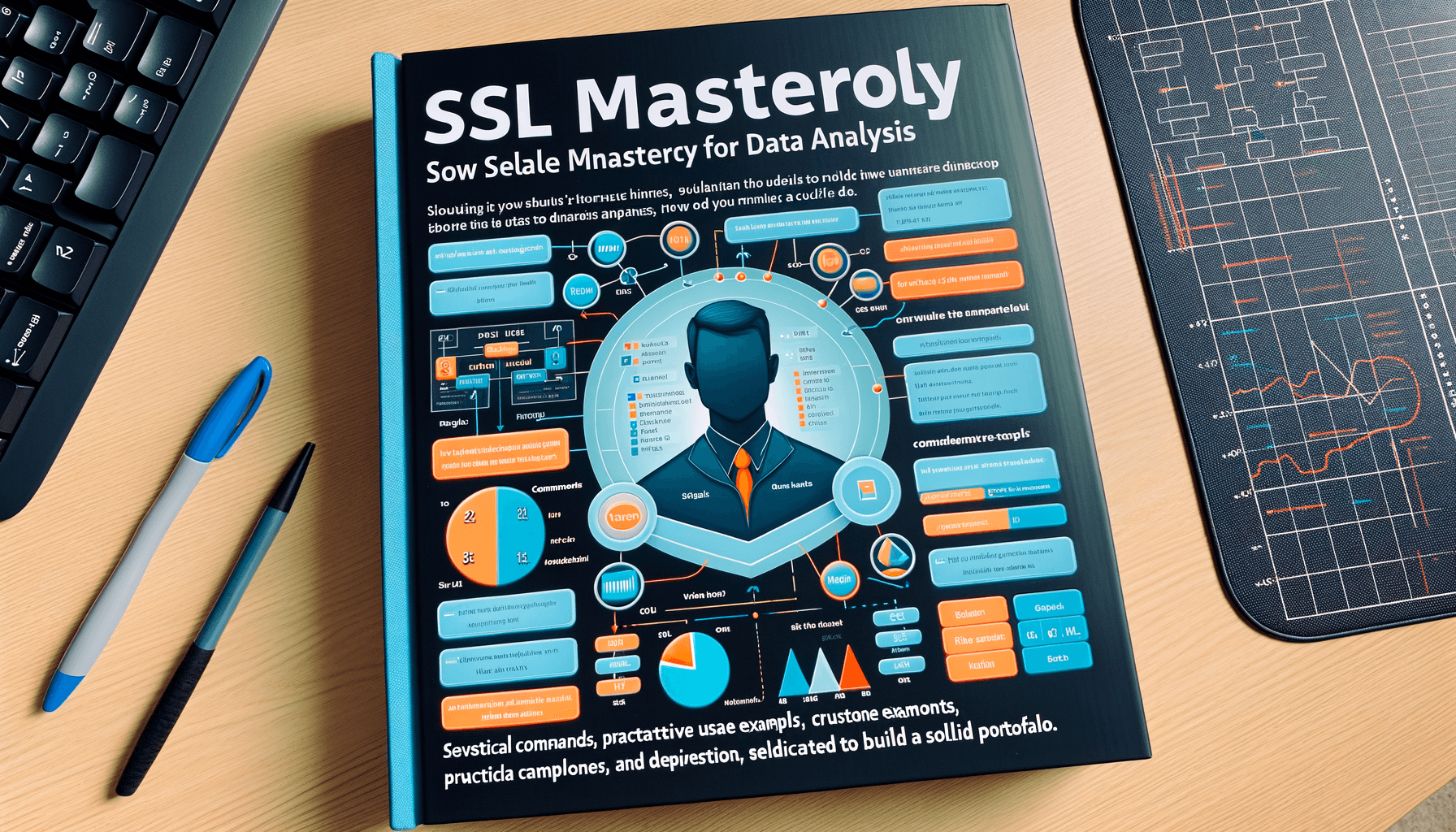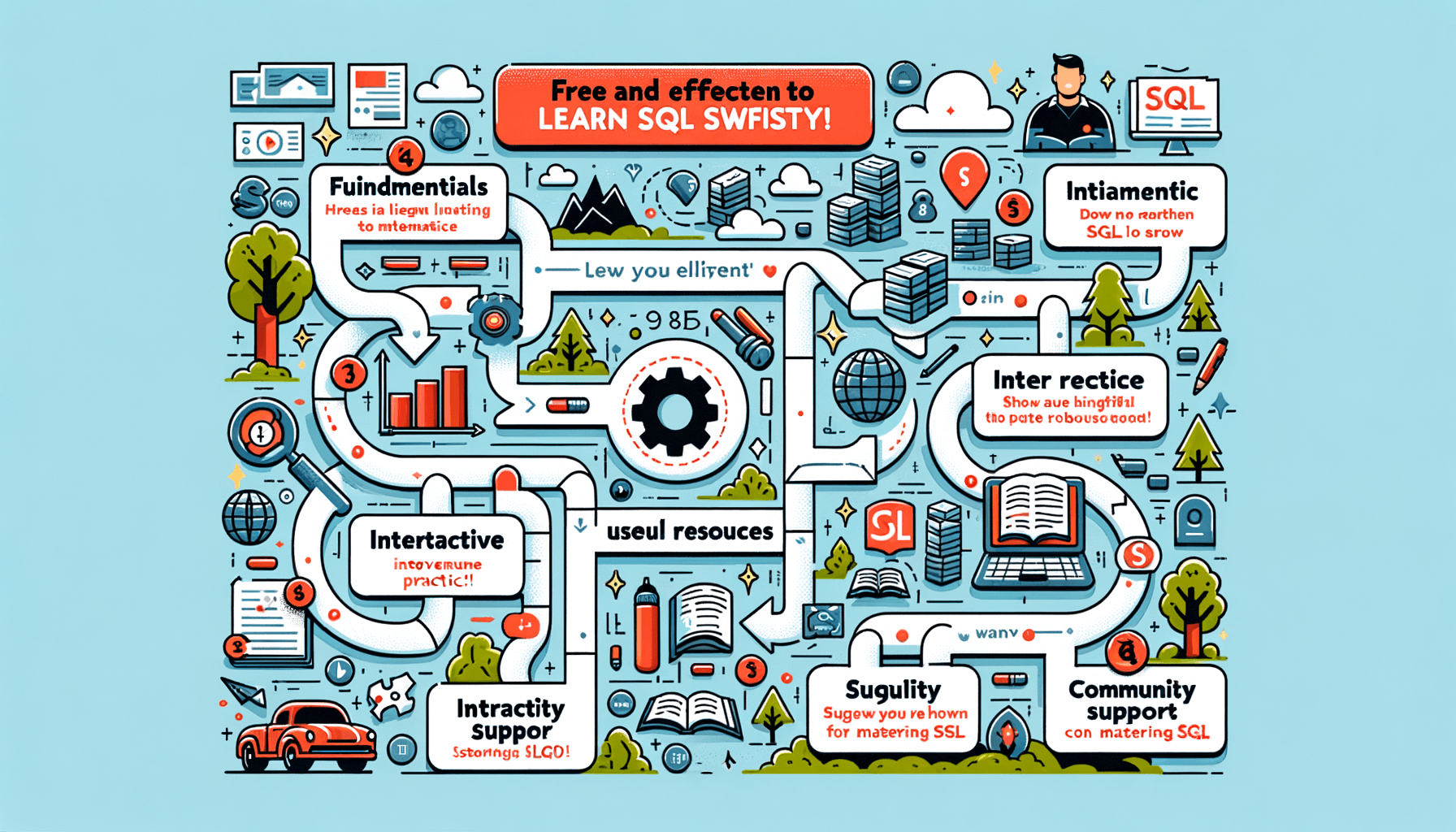A big variety of articles and resources

Quick Start to Databases: Learn SQL Basics Quickly
 Sia Author and Instructor
Learn SQL
Sia Author and Instructor
Learn SQL
8 minute read
Understanding the Basics of SQL
What is SQL?
SQL, or Structured Query Language, is the standard language for managing and manipulating databases. SQL allows you to retrieve and manipulate data efficiently and effectively, making it a fundamental skill for database management and data analysis.
Key Components of SQL
SQL consists of several key components that make it powerful for data handling:
- Data retrieval and manipulation
- Data insertion, updates, and deletion
- Database creation and management
- Data access control
Why Learn SQL?
Learning SQL equips you with the necessary tools to handle vast amounts of data, providing a competitive edge in many technological and business fields. SQL skills are crucial for data analysis, making informed decisions, and optimizing business processes. By mastering SQL, you gain the ability to access and analyze data, which is invaluable in today's data-driven world.
Getting Started with SQL
Setting Up Your SQL Environment
To begin your SQL journey, the first step is to set up a proper SQL environment. This involves choosing the right SQL server and installing necessary software like Microsoft SQL Server and SQL Server Management Studio. Ensure your computer has an internet connection and a web browser, as these are essential to access online SQL courses and resources.
First SQL Queries
Once your environment is ready, it's time to dive into your first SQL queries. Start with simple queries on a single table to understand the basics of data retrieval. As you gain confidence, you can explore more complex queries involving multiple tables and different joining methods such as INNER JOIN and LEFT JOIN.
Understanding SQL Syntax
The syntax in SQL is straightforward but requires precision. Familiarize yourself with the basic syntax rules and how to structure queries effectively. Learning the correct syntax early on will help you avoid common mistakes and increase the efficiency of your data operations.
Mastering Basic SQL Operations
Data Retrieval Techniques
Retrieving data effectively is the cornerstone of mastering SQL. Learn to build basic reports from scratch and retrieve information precisely as needed. This involves understanding various operators like AND, OR, NOT, LIKE, and BETWEEN, which help in crafting precise queries.
Using Conditions in Queries
Effective use of conditions in SQL queries allows for more targeted data extraction. Master the use of logical operators and conditions such as IN and BETWEEN to refine your data retrieval processes. This skill is crucial for generating meaningful insights from the database.
Sorting and Filtering Data
Sorting and filtering are essential for organizing query results in a meaningful way. Learn how to use ORDER BY and WHERE clauses to sort and filter data. This will help you in presenting data that is not only relevant but also easy to understand. Practice these techniques to enhance your SQL query capabilities.
Exploring SQL Functions and Commands
Common SQL Functions
SQL functions are essential tools that allow you to perform complex operations on database data with ease. Learn powerful functions for performing tasks like counting, summing, and finding minimum or maximum values. Here's a brief list of frequently used SQL functions:
- Distinct
- Count
- Sum
- Min
- Max
- Avg
- Case
These functions can significantly enhance your ability to handle data efficiently and effectively.
Advanced SQL Commands
Expanding your SQL knowledge to include advanced commands can greatly improve your database management skills. Commands like JOIN, UNION, and subqueries allow for more complex data retrieval and manipulation. Mastering these commands enables you to work with multiple tables and perform more sophisticated data analysis.
Practical Examples of SQL Use
To solidify your understanding of SQL functions and commands, it's beneficial to see them applied in real-world scenarios. For instance, creating basic SQL reports or performing revenue trend analysis are practical ways to apply what you've learned. Below is an example of a simple SQL query to get all data from a table:
SELECT * FROM table_name;
This example illustrates the basic structure of an SQL query and shows how straightforward it is to retrieve data.
Applying SQL in Real-World Scenarios
SQL in Data Analysis
SQL is indispensable in the field of data analysis, where it is used to extract and manipulate data from databases to form actionable insights. Analysts rely on SQL to perform tasks ranging from basic data retrieval to complex data transformations and aggregations. SQL's ability to handle large datasets efficiently makes it a preferred choice for data analysis across various industries.
SQL for Database Management
Effective database management is crucial for maintaining the integrity and performance of database systems. SQL plays a key role in schema management, data integrity, and query performance. It allows administrators to implement security measures, manage user access, and ensure data consistency. Highlighting the importance of SQL in database management can help in understanding its impact on maintaining robust database systems.
SQL in Web Development
SQL is extensively used in web development to manage the data interactions between web applications and databases. It supports the creation of dynamic content and enables the efficient retrieval of data based on user interactions. Utilizing SQL in web development ensures that applications are robust, scalable, and secure. The integration of SQL with other web technologies enhances the overall functionality and user experience of web applications.
Learning SQL Quickly: Tips and Resources
Fast-track Learning Techniques
To jumpstart your SQL learning, consider engaging with interactive courses that offer real-time feedback and hands-on practice. Platforms like Jumpstart SQL provide comprehensive lessons that are ideal for beginners. These courses often include both fundamental theories and practical exercises, making it easier to understand and apply SQL concepts quickly.
Essential SQL Resources
A variety of resources are available to help you learn SQL efficiently. Books such as Learn SQL in 10 Minutes by Ben Forta are designed to provide quick, digestible lessons. Additionally, online guides and articles can offer valuable insights and tips for effective learning. Exploring these resources at your own pace allows you to build a solid foundation in SQL.
Practice Exercises for Quick Learning
Practical application is key to mastering SQL. Engage in exercises that challenge you to solve real-world problems using SQL. Websites like LearnSQL.com offer interactive courses where you can write SQL code and see immediate results. This hands-on approach helps reinforce learning and improve your problem-solving skills in SQL.
Next Steps After Learning Basic SQL
Advancing Your SQL Skills
Once you've grasped the basics, advancing your SQL skills involves tackling more complex queries and understanding deeper database functionalities. Explore different types of joins like INNER JOIN, LEFT JOIN, RIGHT JOIN, and OUTER JOIN to manipulate and retrieve data from multiple tables effectively.
Integrating SQL with Other Technologies
SQL isn't used in isolation but rather integrated with other technologies to build robust applications. Learning how to combine SQL with programming languages such as Python or JavaScript can significantly enhance your capabilities and make your skills more marketable.
Building Projects with SQL
To solidify your SQL knowledge, start working on projects that challenge you to solve real-world problems. This could involve creating databases for e-commerce sites or developing data-driven applications. The key is to apply what you've learned in practical, hands-on projects to gain confidence and proficiency.
Conclusion
In conclusion, this quick start guide to SQL has equipped you with the essential knowledge and tools to begin your journey in database management. Whether you're a complete beginner or looking to refresh your skills, the resources and tips provided here will help you learn SQL basics quickly and efficiently. Remember, mastering SQL can open up numerous opportunities in various data-driven industries, so continue practicing and exploring more advanced topics as you grow. Happy querying!
Frequently Asked Questions
What is SQL?
SQL, or Structured Query Language, is a programming language designed for managing and manipulating relational databases.
Can I learn SQL in a week?
Yes, with the right resources and dedication, you can learn the basics of SQL in just a week. For a structured approach, consider following a guide like 'How to Learn SQL in a Week'.
Do I need to install software to learn SQL?
No, you don’t need to install anything. Online platforms like LearnSQL.com allow you to learn SQL directly in your web browser.
What are the key components of SQL?
The key components of SQL include tables, queries, and data manipulation commands such as SELECT, INSERT, UPDATE, and DELETE.
How can SQL be used in real-world scenarios?
SQL is widely used in data analysis, database management, and web development, helping professionals manage and analyze large volumes of data effectively.
Where can I find resources to learn SQL quickly?
Websites like LearnSQL.com offer interactive courses and hands-on exercises that can help you learn SQL quickly and effectively.
Related Articles

10 Effective Tips on How to Learn SQL Online
9 minute read

A Comprehensive Guide to Learn SQL for Analysts
8 minute read


